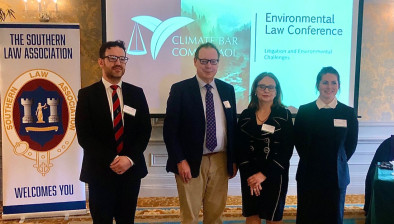Maria O’Loan: Northern Ireland environmental ruling provides important clarifications on government decision-making

Maria O'Loan
Tughans lawyer Maria O’Loan writes on the significance of a major environmental judgment from the Northern Ireland courts, in which she led the legal team advising the successful appellants.
The Court of Appeal’s decision in Re No Gas Caverns and Friends of the Earth’s application has implications not only for the way in which environmental decisions are taken by the Department for Agriculture, Environment and Rural Affairs (DAERA), but for all decisions by government departments in Northern Ireland.
Background
The appeal, brought by Friends of the Earth and No Gas Caverns, was in respect of the grant of three environmental permits for the creation of seven undersea gas storage caverns off the coast of Islandmagee, Northern Ireland. The caverns are expected to be able to store up to 25 per cent of the UK’s natural gas requirements.
The gas caverns are proposed to be created by a process known as solution mining. This entails the creation of cavities in the salt layer by pumping seawater and causing it to dissolve. The resultant hyper-saline solution will be pumped out to sea where it will create a “dead-zone”.
The proposed development is located within the North Channel Special Area of Conservation (SAC), the proposed East Coast (Northern Ireland) Marine Special Protection Area (SPA), the Larne Lough SPA and close to the Maidens SAC.
Grounds of appeal
The appeal put forward two grounds of challenge:
- The failure to refer the applications to the Executive Committee. Under the terms of the Northern Ireland Act and the Ministerial Code, significant, controversial and cross-cutting matters are to be referred to an Executive Committee comprised of all Northern Ireland ministers.
- The taking into account of an irrelevant consideration (namely a “community fund” to mitigate the impacts of the development).
Failure to refer the applications to the Executive Committee
Section 20 of the Northern Ireland Act, when read together with the Ministerial Code, requires that a minister refer significant, controversial and cross-cutting matters to the Executive Committee of the Northern Ireland Assembly. This was an important feature of power-sharing under the Good Friday Agreement. Section 28A provides that the minister has no ministerial authority to take any decision in contravention of the Ministerial Code.
The proposals received significant opposition from members of the public and environmental NGOs. Over 500 individual letters of objection were received, while environmental NGOs such as Friends of the Earth, RSPB, Ulster Wildlife, National Trust, Northern Ireland Marine Task Force, Divers Action Group, Irish Whale and Dolphin Society and others filed substantial objections. A statutory advisory body, the Council of Nature Conservation and Countryside, also objected. Political parties such as Sinn Féin, the Alliance Party and Green Party adopted party positions opposing the project. Other individual MPs and MLAs publicly opposed the project.
High-intensity rationality review
The appellants argued at first instance that the classification of a matter as “significant or controversial” is a matter of law for the court to determine. Although the Court of Appeal rejected this argument, they agreed that the question of whether a matter was “significant or controversial” was one of rationality that required “anxious scrutiny” or a high-intensity rationality review.
Role of Executive colleagues in referral
The Court of Appeal also addressed the fact that a number of other ministers had objected to the proposal but had not asked that the application be determined by the Executive, despite being expressly asked to do so by opponents to the scheme.
The court said there was an apparent disconnect between the objections of the parties and the fact that none of them triggered a referral:
“However, ultimately it is the Minister’s duty to properly determine the issue in the first instance. Put simply, we have concerns as to why this project was not deemed controversial within the meaning of the statute given the objections raised and so we also find for the appellants on this aspect.”
The court appears to have adopted a pragmatic approach which reflects the reality, that other ministers may simply have insufficient information before them to determine whether a proposed decision is significant, controversial or cross-cutting.
Significant or controversial or both
The court also considered whether a matter had to be both significant and controversial to require Executive referral.
The court said that applying ordinary and natural meaning to this section makes it clear that a matter does not have to be both significant and controversial to require referral to the Executive Committee: “It can be significant or controversial or both.”
No explanation from the minister
In this case, the submission to the minister contained detailed legal advice on the issue of whether the decision should be referred to the Executive Committee. That advice was redacted and is not in the public domain.
The only material documenting the minister’s thinking before the court was a record of responses to Assembly questions and a one-line response to extensive ministerial submissions which simply read: “Option 1 on the basis that appropriate controls are in place to mitigate environmental impacts”.
The Department instead relied on an affidavit from a departmental official on the matters which were taken into account by the minister.
Whilst the Court of Appeal made it clear that it was not necessary for a minister to depose evidence, the factual basis of this case made it difficult to understand the reasons why the minister had reached the conclusions that he did.
Whilst it is not anticipated that ministers will depose evidence in judicial review proceedings, it seems likely that ministers will set out more detailed reasons for their decisions in future to avoid or minimise the risks of such challenges.
Significant
The Court of Appeal expressed concern in respect of the lack of rationalisation for this decision by the minister.
In the context of this case, the court said that it was necessary for it to scrutinise even more closely the rationale for a decision which on the face of it conflicted with international and domestic standards on climate change without explanation given the clear expressions of intent found in the Northern Ireland strategy documents.
Policy backdrop
The Court of Appeal referred to the policy backdrop of the decision, which includes the Paris Agreement and commitments to net zero.
It found that there was sufficiently clear information available that approving the project had the effect of potentially locking in fossil fuel dependency for 40 years to come which was of obvious significance to a climate policy directed at net zero by 2050. These matters were raised by both objectors and a statutory consultee.
The Court of Appeal also referred to factors such as energy security and the strategic significance of the project, as advanced by the notice party, as being relevant to the determination of whether the project was significant.
Information from the developer
The Court of Appeal made express reference to the information contained within the environmental statement and other documents submitted in support of the development which repeatedly referred to the development as “strategic”, “significant”, correspondence from the developer to the first minister and internal departmental communications.
Against this backdrop, the court concluded that the minister had acted irrationally in failing to refer the matter to the Executive Committee. The decision sets an important precedent for the factors to be considered when determining whether a matter is “significant” and requires Executive referral. In this case the court considered the tensions between climate change commitments and issues around energy security.
It seems likely that we will see other proposed decisions which appear to conflict with national and international climate change and environmental commitments. These will require careful consideration as to whether it is necessary to refer the matter to the Executive. The case also underscores the importance of careful legal review of environmental statements and other documents placed in the public domain in support of a project.
Controversial
In determining that the development was controversial, the Court of Appeal relied upon a number of factors, including that a significant number of independent bodies including eNGOs and a statutory consultee, the Council for Nature Conservation and Countryside, made very cogent objections as well as opposition from a number of political parties and individual politicians.
It appears that the Court of Appeal looked at matters in the round but was particularly influenced by the broad range of representations received and the identity of those making representations both for and against the project.
Cross-cutting
Where a matter cuts across the responsibilities of more than one minister “more than incidentally” that matter must be referred to the Executive Committee.
The Court of Appeal stated that it seemed odd that this project was not deemed to be a cross-cutting matter given that the Department for Economy has statutory and policy responsibility for gas supply and energy security. The Court of Appeal concluded that the judge was not correct to dismiss this case as one that did not involve the statutory responsibility of other departments: “If statutory responsibility is engaged as we find, it cannot be said that given the overall climate picture this was simply ‘incidental’.”
This seems to extend the meaning of “cross-cutting” to policy responsibility. Given the increased policy focus on climate change and energy, it seems likely that a wider range of matters will be considered cross-cutting in future.
The community fund
In DAERA’s EIA consent decision of March 2021 under the heading ‘Potential Environmental Impacts and Proposed Mitigation’, a number of specific measures are addressed. Under the heading “Socio-Economic”, the following text appeared:
“As a compensatory measure, the Company proposed to set up a community benefit scheme as part of the overall proposal. A community fund of £1M has been created by [IMEL], with the aim of supporting local projects and initiatives over the life of the project”
This formed part of the submission to the minister.
It was agreed by all parties that it would be unlawful for the minister to take into account the community fund. What was in dispute was whether the minister did in fact take it into account.
The Department relied on the fact that the community fund did was not conditioned or referred to in the marine licence and the minister’s one-line response to the extensive Ministerial Submissions which simply read: “Option 1 on the basis that appropriate controls are in place to mitigate environmental impacts”.
The Court of Appeal was troubled by the lack of evidence before it:
“To our mind it is a bridge too far to suggest that whenever this community fund was impermissibly part of the material that went before the Minister, that it can just simply be inferred that he did not take it into account. Thus, we cannot agree with [the judge] who was prepared to accept that the community fund although referenced was not treated as a material consideration. We are not so reassured on the basis of the evidence which we find to be insufficient in dealing with this issue. It follows that based on the Supreme Court decision in Wright, it is unlawful to take into account such a fund in a planning application. Hence, we are compelled to say that the evidential justification for this aspect of the decision making also fails to convince us.”
Conclusions
The Court of Appeal judgment has wide ranging implications for the way in which decisions are made by Northern Ireland ministers.
A striking feature of the decision is court’s apparent criticism of the record of the minister’s rationale for concluding that the development was not significant, controversial or cross-cutting. It has been common practice for ministers to simply endorse a recommendation set out in a ministerial briefing with little or no elaboration.
The Court of Appeal appears to acknowledge the importance of climate change commitments and the tensions that might arise between those commitments and other decisions. This might result in more decisions that result in a conflict with environmental policies and commitments coming before the Executive.
A remedies hearing is scheduled to take place at the end of June 2024.
![]()
- Maria O’Loan is an of counsel at Tughans LLP, the firm which advised the appellants in this case, instructing Conor Fegan of FTB Chambers.










